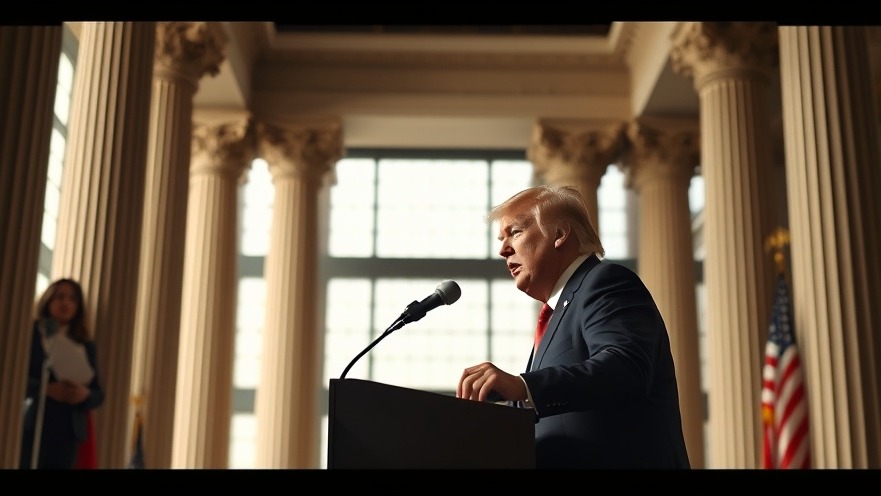
Trump's Provocative Message Following US Strikes on Iran
In a significant and controversial statement following U.S. military operations aimed at Iranian nuclear facilities, former President Donald Trump declared his vision of 'MAKE IRAN GREAT AGAIN.' This slogan, reminiscent of his 2016 campaign catchphrase, hints at an audacious push for regime change in Iran, revitalizing long-simmering debates about U.S. foreign policy in the Middle East.
Historical Context: The Never-Ending Tension in the Middle East
Understanding Trump's declaration requires a glimpse into the historical context of U.S. relations with Iran. Since the Iranian Revolution in 1979, the U.S. has wrestled with the complexities of Iranian leadership and its geopolitical stance. The past decades have seen sanctions, diplomatic conflicts, and intermittent military engagements revolving around Iran's nuclear ambitions. Trump's recent suggestion for regime change comes amid failed negotiations and rising tensions, exacerbating fears of military escalation in the region.
The Domestic Repercussions: A Divided Congress
Domestically, Trump's calls for a change in Iranian governance are stirring controversy. Many legislators, including bipartisan groups, are pushing back against military interventions, with some labeling Trump's strategies as unconstitutional. The push for a Congressional vote on U.S. involvement in Iran highlights a significant divide within Congress, mirroring broader public sentiment. Polls show increasing skepticism among voters regarding military action abroad and a desire for diplomatic solutions.
Predicting Future Interactions: What Lies Ahead for Iran and the U.S.?
As geopolitical dynamics evolve, insights suggest that Trump's actions may open doors to a fraught new chapter in U.S.-Iranian relations. If proposed regime change takes shape, analysts warn of potential retaliations from Iran, possibly leading to a cycle of conflict that endangers both regional and global stability. Future outlooks will depend on diplomatic engagement and the international community’s response to U.S. military actions.
The Human Element: Impact on Ordinary Iranians
While political maneuvers dominate headlines, it is crucial to consider the human cost of these decisions. Ordinary Iranians, living under a regime that many have grown disillusioned with, face the brunt of escalating tensions. The emotional and economic ramifications of continued U.S. strikes and potential regime change resonate across Iranian society, shaping public sentiment towards both their government and the U.S.
Sorting Fact from Fiction: Common Misconceptions about U.S.-Iran Relations
Many misconceptions abound around U.S. policy toward Iran. One prevalent myth is that all U.S. engagements are purely aggressive. In reality, there have been numerous attempts at diplomatic relations, although failures have often overshadowed achievements. Additionally, not all Iranians support their government, creating a complex landscape where American intervention must navigate the diverse opinions of Iranian society.
How You Can Stay Informed
In the face of rapid developments, staying informed about U.S.-Iranian relations is more important than ever. By following reliable news sources and examining multiple perspectives, readers can gain a clearer picture of the implications behind actions like Trump's rhetoric on regime change. Engaging in conversations about these topics can also highlight the diverse viewpoints within both American and Iranian communities.
In a world where headlines shift rapidly, understanding the multifaceted implications of U.S. foreign policy is essential. As discussions about regime change in Iran evolve, Americans must consider the potential consequences of military actions and the enduring complexity of international relations.
Stay tuned for more in-depth analysis on this critical issue as it develops. Understanding the nuances in U.S. foreign policy could serve to promote more informed discussions about peace and diplomacy moving forward.
 Add Element
Add Element  Add Row
Add Row 











 Add Row
Add Row  Add
Add 


Write A Comment